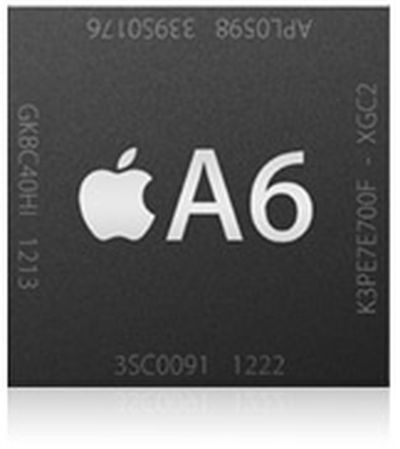Apple Reportedly Signs Deal with Samsung for 14-nm A9 Chips Starting in 2015
 The Korea Economic Daily reports that Apple and Samsung today officially signed an agreement that will see the two companies working together on future A-series chips for Apple's iOS devices, with the deal specifically covering A9 chips based on a 14-nanometer process node starting in 2015. The claim comes just weeks after Taiwan Semiconductor Manufacturing (TSMC) confirmed a deal with Apple to begin producing A-series chips in 2014.
The Korea Economic Daily reports that Apple and Samsung today officially signed an agreement that will see the two companies working together on future A-series chips for Apple's iOS devices, with the deal specifically covering A9 chips based on a 14-nanometer process node starting in 2015. The claim comes just weeks after Taiwan Semiconductor Manufacturing (TSMC) confirmed a deal with Apple to begin producing A-series chips in 2014.
Samsung Electronics had supplied the AP [application processor] to Apple since 2007 but lost the contract to supply 20 nano AP A8 chips to Apple to Taiwan's TSMC last year when it was engaged in patent disputes with Apple. Samsung Electronics developed state-of-the-art 14 nano models ahead of its rival TSMC, regaining the order from Apple.
A previous report about Apple's agreement with TSMC had indicated that it was a three-year deal covering not only Apple's future A8 chip but also A9/A9X chips. The Wall Street Journal's report had indicated that Samsung would remain Apple's primary supplier through next year as TSMC began ramping up its production.
As a result, it is unclear whether today's deal will see both TSMC and Samsung producing A9 chips for Apple or if Apple has already shifted gears to return to Samsung as its primary supplier as part of its long-term roadmap.
Apple has reportedly been seeking to reduce its reliance on Samsung as a component supplier as the two companies have become fierce rivals in both the mobile marketplace and in the courtroom. The two companies have, however, continued working together in several areas, particularly where Samsung's competitors in the component market are unable to match its technology, production capacity, or pricing.
The shift to TSMC for production of the high-profile main chips for Apple's iOS devices had been viewed as breaking one of the most significant remaining ties between Apple and Samsung, but it appears that Samsung has been able to bring Apple back into the fold by leading the charge to 14-nm chips. With partnerships with both Samsung and TSMC, it appears that Apple should be well-positioned to take advantage of whichever company takes the lead in developing the latest technologies.
Late last week, it was reported that Apple had bought into a fab, perhaps with an eventual goal of producing its own chips for its mobile devices, although any such move is almost certainly years away given the need to ramp up expertise and facilities for such production.
Popular Stories
Apple's next-generation iPhone 17 Pro and iPhone 17 Pro Max are less than three months away, and there are plenty of rumors about the devices.
Apple is expected to launch the iPhone 17, iPhone 17 Air, iPhone 17 Pro, and iPhone 17 Pro Max in September this year.
Below, we recap key changes rumored for the iPhone 17 Pro models:Aluminum frame: iPhone 17 Pro models are rumored to have an...
The long wait for an Apple Watch Ultra 3 appears to be nearly over, and it is rumored to feature both satellite connectivity and 5G support.
Apple Watch Ultra's existing Night Mode
In his latest Power On newsletter, Bloomberg's Mark Gurman said that the Apple Watch Ultra 3 is on track to launch this year with "significant" new features, including satellite connectivity, which would let you...
Apple is developing a MacBook with the A18 Pro chip, according to findings in backend code uncovered by MacRumors.
Earlier today, Apple analyst Ming-Chi Kuo reported that Apple is planning to launch a low-cost MacBook powered by an iPhone chip. The machine is expected to feature a 13-inch display, the A18 Pro chip, and color options that include silver, blue, pink, and yellow.
MacRumors...
The upcoming iPhone 17 Pro and iPhone 17 Pro Max are rumored to have a slightly different MagSafe magnet layout compared to existing iPhone models, and a leaked photo has offered a closer look at the supposed new design.
The leaker Majin Bu today shared a photo of alleged MagSafe magnet arrays for third-party iPhone 17 Pro cases. On existing iPhone models with MagSafe, the magnets form a...
Apple is planning to launch a low-cost MacBook powered by an iPhone chip, according to Apple analyst Ming-Chi Kuo.
In an article published on X, Kuo explained that the device will feature a 13-inch display and the A18 Pro chip, making it the first Mac powered by an iPhone chip. The A18 Pro chip debuted in the iPhone 16 Pro last year. To date, all Apple silicon Macs have contained M-series...
Apple today seeded the second betas of upcoming iOS 18.6 and iPadOS 18.6 updates to public beta testers, with the betas coming just a day after Apple provided the betas to developers. Apple has also released a second beta of macOS Sequoia 15.6.
Testers who have signed up for beta updates through Apple's beta site can download iOS 18.6 and iPadOS 18.6 from the Settings app on a compatible...
iOS 26 and iPadOS 26 add a smaller yet useful Wi-Fi feature to iPhones and iPads.
As spotted by Creative Strategies analyst Max Weinbach, sign-in details for captive Wi-Fi networks are now synced across iPhones and iPads running iOS 26 and iPadOS 26. For example, while Weinbach was staying at a Hilton hotel, his iPhone prompted him to fill in Wi-Fi details from his iPad that was already...
Apple hasn't updated the AirPods Pro since 2022, and the earbuds are due for a refresh. We're counting on a new model this year, and we've seen several hints of new AirPods tucked away in Apple's code. Rumors suggest that Apple has some exciting new features planned that will make it worthwhile to upgrade to the latest model.
Subscribe to the MacRumors YouTube channel for more videos.
Heal...
As part of its 10-year celebrations of Apple Music, Apple today released an all-new personalized playlist that collates your entire listening history.
The playlist, called "Replay All Time," expands on Apple Music's existing Replay features. Previously, users could only see their top songs for each individual calendar year that they've been subscribed to Apple Music, but now, Replay All...
 The Korea Economic Daily reports that Apple and Samsung today officially signed an agreement that will see the two companies working together on future A-series chips for Apple's iOS devices, with the deal specifically covering A9 chips based on a 14-nanometer process node starting in 2015. The claim comes just weeks after Taiwan Semiconductor Manufacturing (TSMC) confirmed a deal with Apple to begin producing A-series chips in 2014.
The Korea Economic Daily reports that Apple and Samsung today officially signed an agreement that will see the two companies working together on future A-series chips for Apple's iOS devices, with the deal specifically covering A9 chips based on a 14-nanometer process node starting in 2015. The claim comes just weeks after Taiwan Semiconductor Manufacturing (TSMC) confirmed a deal with Apple to begin producing A-series chips in 2014.





















